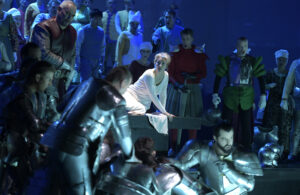
The Deutsche Oper Berlin has opened its 2025-26 season with a compelling production of Richard Wagner’s opera “Tannhäuser.” This work, revered for its exploration of profound themes such as sacred and profane love, showcases Wagner’s ability to intertwine beauty with unsettling emotional depth. Set against the backdrop of 13th-century Germany, the opera presents a dramatic struggle between the allure of Venus and the constraints of societal norms represented by the Wartburg court.
At the heart of the narrative is the character of Tannhäuser, a Minnesinger torn between two worlds. Following a year spent in the enchanting grip of the goddess Venus, he seeks redemption by returning to the court of the Landgrave of Thuringia, where his beloved Elisabeth awaits. The ensuing singing contest reveals Tannhäuser’s internal conflict, culminating in a passionate defense of sensual love that shocks the court and leads to his exile.
Director’s Vision and Staging Choices
Director Kirsten Harms has chosen to remain true to the medieval setting of the libretto, employing period-appropriate imagery and costumes designed by Bernd Damovsky. This includes suits of armor that hang prominently, which, while visually striking, add an element of noise during the pivotal singing contest. The production features a central platform that transforms between settings, allowing for dramatic transitions from the seductive Venusberg to the somber atmosphere of the pilgrimage.
In a noteworthy directorial decision, Harms cast a single singer, Camilla Nylund, in the dual roles of Venus and Elisabeth. This choice effectively illustrates the duality of love, with Nylund showcasing her versatility in both roles. Her portrayal of Elisabeth reflects purity and devotion, while her interpretation of Venus embodies lust and defiance.
Nylund’s performance reaches a pinnacle in the opera’s climax, where her tender rendition of Elisabeth’s prayer, “Allmächt’ge Jungfrau, hör mein Flehen!” is infused with raw emotion, contrasting sharply with her later embodiment of Venus.
Stellar Performances and Musical Excellence
The role of Tannhäuser was performed by Klaus Florian Vogt, a celebrated Wagnerian tenor known for his luminous voice. His performance captivated the audience, particularly during his hymn to Venus, where he delivered powerful and passionate notes. Vogt’s ability to convey a spectrum of emotions, particularly evident in the demanding “Römerzählung” in the third act, demonstrated his exceptional skill and stamina.
Baritone Thomas Lehman, portraying Wolfram von Eschenbach, delivered the opera’s renowned aria, “O du, mein holder Abendstern,” with a smooth and dreamy quality. Despite an unfortunate staging choice that positioned him awkwardly during a critical moment, his performance resonated deeply with the audience.
Other notable cast members included Kangyoon Shine Lee as Walther, who impressed with his well-projected tenor, and Michael Bachadze as Biterolf, whose deep baritone effectively conveyed disdain. Christof Fischesser rounded out the cast as Landgrave Hermann, commanding respect with his authoritative bass.
Conductor Axel Kober led the Deutsche Oper Orchestra with remarkable sensitivity, ensuring that the rich textures of Wagner’s score complemented the singers. The brass section was particularly impressive, while the chorus shone brightly, delivering the “Pilgrims’ Chorus” with a gravitas that left an indelible mark on the performance.
Overall, the Deutsche Oper Berlin’s production of “Tannhäuser” stands out not only for its powerful performances but also for its thoughtful direction and innovative staging. The opera’s exploration of love, redemption, and spiritual conflict resonates deeply, reaffirming Wagner’s enduring legacy in the world of opera.





